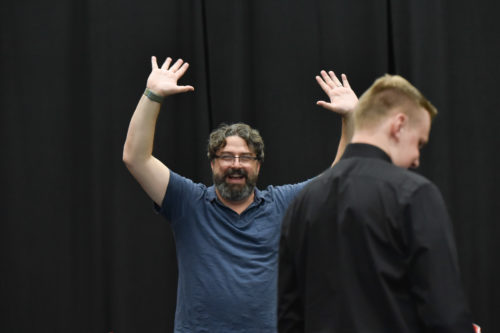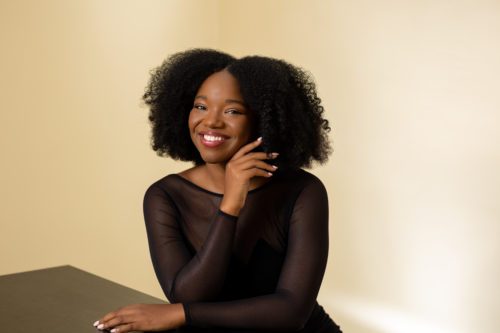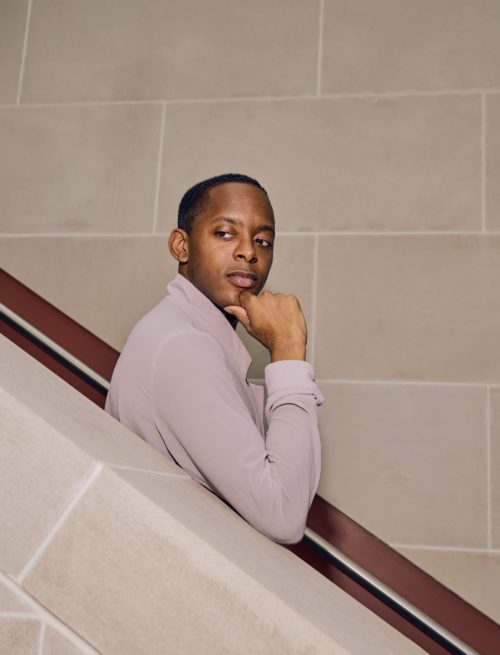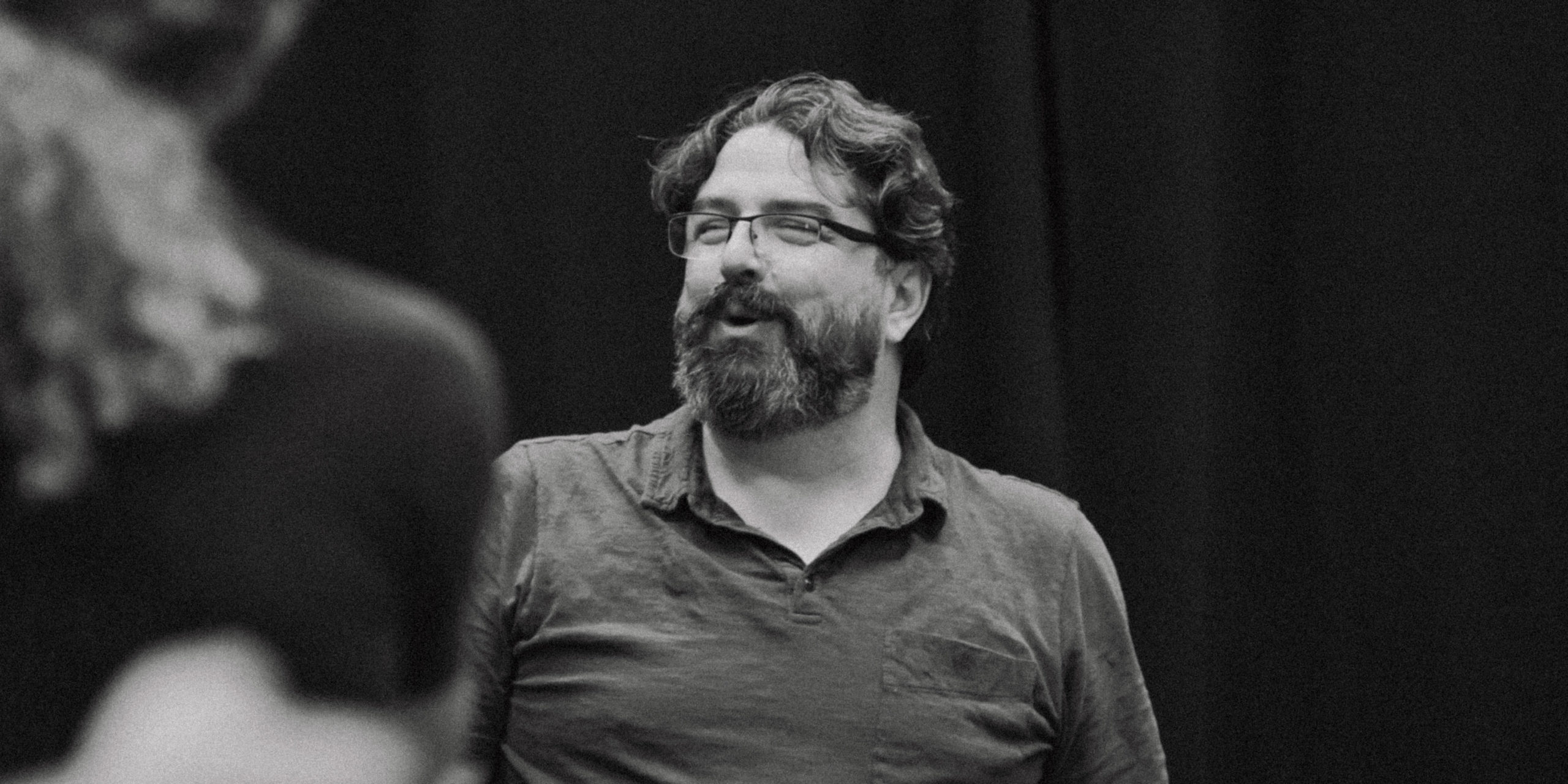At an early October opera rehearsal in the Eastman School of Music’s black box theater, Rihanna’s “This is What You Came For” blasts over the speakers and a group of opera singers are clapping, snapping their fingers, strutting, and using jazz hands to the beat in a mini dance routine. It was a warm-up exercise choreographed by Patrick Diamond, Eastman’s new Associate Professor of Opera and Director of Production for Eastman Opera Theatre.

Patrick Diamond leads students in a dance warm up at a recent Eastman Opera Theatre rehearsal. Photo by Lauren Sageer.
“Let’s make it a little spicy,” says Diamond, as he adds more movements on unexpected beats. The students are out of sync at times but are all smiling and laughing as they give it the old college try. It’s not about perfection. “It’s all to make you concentrate and focus,” Diamond said.
The routine was a prelude to a rehearsal of We’ve Got Our Eye on You, a 2015 opera by Nkeiru Okoye, an American-born composer of African American and Nigerian ancestry, with a libretto by David Cote. The opera has a humorous plot loosely based on Greek mythology’s “Clash of the Titans,” where the coming-of-age Graeae sisters, who share an eye, try to hook up with “bad boy” Greek god Perseus, and learn something about the vacuity of meaningless sexual encounters.
It’s one of two operas being performed on the Eastman Opera Theatre’s fall double bill performances titled “Mythology Through a New Lens”—the other being Jake Heggie’s To Hell and Back, a much more interior work, also based on Greek mythology—which will run from November 2 through 5 in Kilbourn Hall. Performances Thursday through Saturday are at 7:30 p.m. Sunday’s performance is at 2:30 p.m. The production is Diamond’s Eastman directorial debut.
From Theater to Opera
Dancing to pop music might not seem much like an opera rehearsal, but Diamond has a method to his madness: he’s getting the students into their bodies for an opera that demands a lot of physicality. “Sharing an eye is crazy,” says Diamond. “They’re all these physical challenges. How is blindness involved? How do we share an eye? It really asks to be staged very quickly and it is very playful.”
Diamond’s methods may seem atypical, but they do reflect his unusual background as someone who got his start and much of his formal education in theater, not music or opera. Diamond often uses movement-based exercises to get students into mindset of their characters—or to give them breaks from difficult, intense scenes. Such work won’t be visually apparent during the operas, but they “make a huge difference in the way that students are able to perform and apprehend the material,” says Diamond.
Originally from New Mexico, Diamond didn’t initially intend to pursue arts or music, but found opportunities to be involved with theater and directing during his undergraduate education and got hooked. Wanting to continue forward in the theater world, he landed a position as a technical apprentice at the Santa Fe Opera, the largest performing arts organization in New Mexico. “That was just a way to get into theater there,” he remembers.
“I just got to watch the directors work while I was there. And then I came back the next year as an assistant stage manager and Francesca Zambello was there and I just became really interested in directing more and more.”
It led him to a position as an assistant stage manager at the Aspen Music Festival and then as an assistant director there under the famous director Werner Herzog. It’s where Diamond—a theater kid—learned opera repertoire.
Knowing he had much more to learn about the art of directing, he applied to graduate programs in directing and got into Yale University’s School of Drama (now the David Geffen School of Drama). Except Yale’s drama school is not an opera school. He did theater exclusively throughout his graduate education. But connections kept him in the opera world. And his professional work eventually landed him back at Yale to teach directing in both his domains: theater and opera.
“I found myself by chance in the opera world and so I’ve been very lucky with who I’ve been able to work with since, and how I’ve been able to integrate those two things together,” he says of his theater training coupled with opera directing gigs. “I’ve learned from and been involved with people who really valued music and who were encouraging me to experiment on developing my own theatrical skills within musical projects.”
Playing to His Strengths
The challenge, however, is that Diamond is not a traditional musician turned director. Although he can read music, he doesn’t play an instrument and he has limited formal training as a musician.
“I remember this one rehearsal on a new piece, it was some crazy time signature and the piece kept changing time signatures every four bars, and I could not figure out how to cue it,” he remembers. “I’ve always had to go back to the basics at times and figure out, ‘Is this moment about rhythm? Is this moment about melody or counterpoint?’ Or, ‘What’s the most important thing in the storytelling here?’ It took me a long time to even start thinking that way. And I would still say that every day I’m learning more about how to do that work.”
As for becoming a professor at Eastman with some of the world’s best musicians all around him, “it’s super intimidating,” he says. “I’m constantly in awe of the people that are around me and I’m trying to learn as much as I can in the process.”
But as he told the non-musician actors in his Yale opera directing practicum, “You come with this whole host of other skills that these singers are hungry for.” Diamond as a director has much to offer Eastman’s opera singers, who need to learn the art of acting. And the opera field has much to learn from a director like Diamond who can separate himself from worn opera tropes and conceive of operas using more relevant, contemporary storytelling.
The fall operas, which contemporize ancient stories, will put his storytelling skills on display.
Being at Eastman is a generational homecoming for Diamond: Although he grew up in a completely different region of the country, his parents and extended family are from Rochester and he frequented Rochester every couple of years as a child. Even though his working-class parents never intersected much with Rochester’s arts scene—his grandmother ran a boarding house and his father was a construction worker—Diamond found his own path to the arts, which seems about right for someone with Rochester roots.
To Hell and Back
We’ve Got Our Eye on You may be comical, but Jake Heggie’s short, contemporary opera To Hell and Back is just the opposite: it takes on the difficult topic of domestic sexual abuse, based loosely on the Greek myth of Persephone, the abducted goddess of spring (in the story as told by Ovid’s Metamorphoses). The opera revolves around two characters: Stephanie, whose husband is abusing her, and Anne, Stephanie’s mother-in-law.
“This is really the story about a young woman escaping this violence,” says Diamond. “She calls herself the ‘queen of hell’ and she’s finding a way to escape that and come into her own with the help of her mother-in-law.”
As for Anne, the mother-in-law, “it becomes all about wrestling with the idea of ‘this is my son and I have no control over this situation. What are my choices, what can I do for myself?’”

Kayla Sconiers is Anne in the Eastman Opera Theatre’s fall 2023 production of “To Hell and Back.”
Mezzo-soprano Kayla Sconiers, last semester’s William Warfield Scholarship recipient who will share the role of Anne, says that the challenge of the opera is that the subject matter is so heavy, yet the action is so sparse. There is not a lot of action to help anchor herself as an actor and singer.
But, “Pat Diamond is a great director,” she says. “Ultimately, he doesn’t like to just assign actions. He loves asking and figuring out the objective of the character. And then you have tasks that serve as benchmarks to get you to that objective, which I love. It helps foster gestures and emoting the text.”
Diamond says that there are emotional challenges for the students in a work that deals with violence and sexual assault. Yet, he’s less worried with how they’ll fare on stage and more about how they’ll manage outside of rehearsals while living, breathing, and learning such emotionally intense roles. He says students are working with intimacy coordinator Lindsay Baker, a Eastman instructor of opera, who is “helping everyone figure out how to build a container, so that they can leave that work behind and not carry it with them all the time, because it’s very, very heavy.”

Holden Turner plays Perseus in the Eastman Opera Theatre’s fall 2023 production of “We’ve Got Our Eye on You.” Photo by Tara Bryan Photo.
Even in We’ve Got An Eye on You, Diamond is attuned to the students’ emotional states, says Holden Turner, a junior at Eastman who will share the role of Perseus, the stereotypical womanizer who also has complicated emotions about his relations with the Graeae sisters. “One of the things that I really enjoy when working with Professor Diamond is that he is extremely kind and accommodating to each member of the cast, always making sure we have what we need and that we are mentally able to work through things and feel comfortable doing so.”
Despite the mythological themes, Diamond has set both operas in a rural American Route 66 diner, “which has a lot of license to it because the diner in To Hell and Back is in Appalachia, whereas the diner in We’ve Got Our Eye on You is in the Southwest somewhere. We created a flexible space, a place where you can tell stories and have community, because both those things are important in both pieces.”
And although these are two twenty-first century operas, Diamond says there are a lot of earworms and some musical theater influences. “But there’s a lot of thought and some complexity to the music in both pieces. They’re both really engaging music.”
Having just arrived at Eastman this fall, directing the fall double-bill production has been a quick introduction to his new professional home. “I have so enjoyed the work that I’ve gotten to do with the students so far and the staff and my colleagues on the faculty in my department here at Eastman,” he says. “It’s been a really great project, and a great introduction for me to the school itself. I’m excited to be working on this with everyone.”
However, Diamond has a nearly 30 year working relationship with Timothy Long, Eastman’s Artist and Music Director of Opera. Of working with Diamond, Long says, “We understand each other extremely well and the differences in our personalities and processes complement each other in a way that results in a deeply satisfying operatic journey. I am looking forward to our work together at Eastman.”
Eastman Opera Theatre: A Double Bill – Mythology Through a New Lens
Wilson Southerland, Conductor
Patrick Diamond, Director
Tickets are $20
Performances in Kilbourn Hall:
Thursday, November 2 | 7:30pm
Friday, November 3 | 7:30pm
Saturday, November 4 | 7:30pm
Sunday, November 5 | 2:30pm
Top photo: Lauren Sageer
